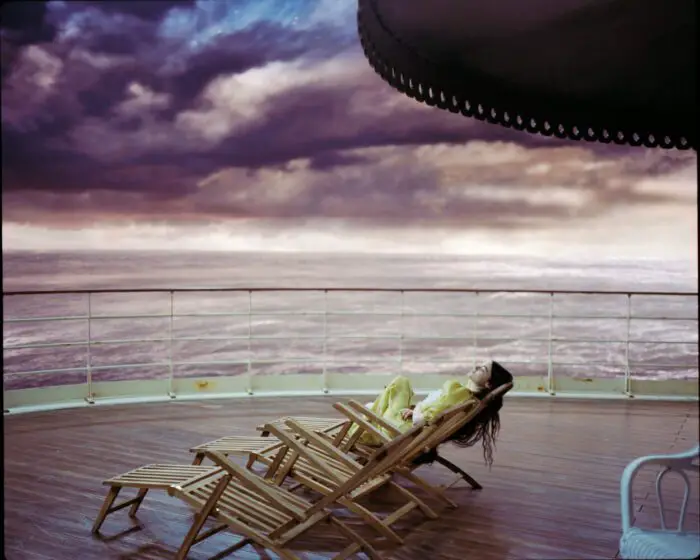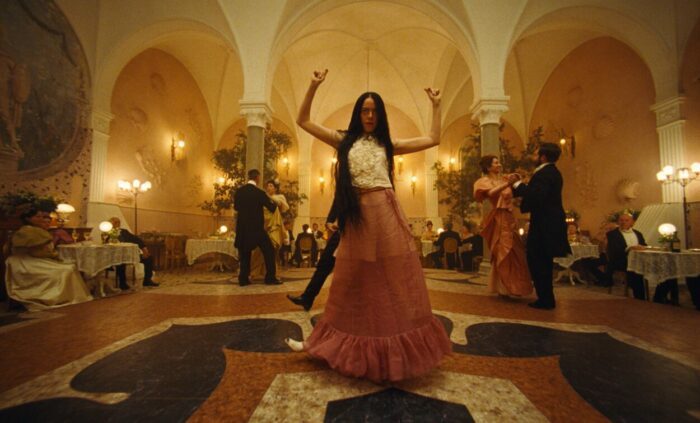Anyone who has seen one of Yorgos Lanthimos’ previous films knows they’re getting into something…strange. The weirdness of his latest film, however, does not fall entirely on Lanthimos’ shoulders. Poor Things is based on a 1992 novel of the same name by Alasdair Gray. It centers on Bella Baxter (Emma Stone) and her journey into the outside world. She has spent most of her life in the home of Dr. Godwin Baxter (Willem Dafoe) and under the supervision of Dr. Baxter’s student, Max McCandles (Ramy Youssef). A life behind the walls of the Baxter home is all that she’s ever known, but Bella begins to yearn for something more. What results is a deep exploration of identity, rebirth, and life itself.
When the audience first meets Bella, she has the mental age of a two-year-old, despite the fact that she looks like she’s in her thirties. Max’s role in Bella’s life is to stay with her every hour of every day and take notes on her development. Bella is not a normal person. She was brought to life in a Frankensteinian manner by Dr. Baxter, who himself was the subject of a few experiments at the hands of his father. Bella was clinically dead, and when Dr. Baxter brought her back to life, she regressed to the mental age of a child. Strangely, though, she quickly matures intellectually at a rate that far exceeds that of regular human development. She soon grows tired of the prison Dr. Baxter has kept her in and sets out to discover the world on her own.

The outside is a beautiful Jules Verne-esque version of our world. We recognize the names of the cities Bella visits, but her version of London looks nothing like ours. There are flying cars, steampunk buildings, and dazzlingly dressed people. It’s at this moment, when Bella ventures outside, that her black-and-white world becomes colorful (literally and figuratively). She sees countless possibilities and is simultaneously overwhelmed and thrilled at the chance to experience everything there is to offer. Her guide of sorts is Duncan Wedderburn (Mark Ruffalo), an overly confident fop. He’s more than willing to take Bella away from the rules of Dr. Baxter, but has a problem with her when she finds a voice of her own.
A film about the suffocating nature of womanhood is nothing new, but Poor Things has an ace up its sleeve: it’s about a woman experiencing life in society as an individual without any prior experience of norms and expectations. Bella finds freedom in the outside world, but also learns that Duncan and strangers she meets want to be in control of her actions. If someone is policing your freedom, are you truly free? It’s a question that Bella, and Poor Things, wrestles with as she travels through her hedonistic adventures. When the media tells stories of women who rebel against societal conventions, there’s an understanding that they’re working against ideals that have been instilled in them since birth. It’s evident in the ways toys are marketed to youth, the little sayings on baby onesies, and the way adults treat their children. Humans have created a strong gender binary and assigned specific traits and emotions to people based only on biology.

What happens when a woman enters the world without any shame? Without any concern for the unspoken rules that dictate how she should act? What guides Bella on this experience is simply her desires. If she wants to have sex for money because she enjoys it, she will. If she wants an extra pastry, she’ll buy one with the money she’s earned. If she doesn’t like the taste of a food, she’ll spit it out. That is the totality of Bella’s simple thought processes. It’s really quite beautiful to watch how she doesn’t dance around things, how she says what she feels when she feels it. There’s no better actor to be at the helm of this character than Stone, who is finally let loose on a playground that understands her odd sense of humor. The people she meets along the way call her “intriguing,” but not because they know that she was brought back to life. They attribute that adjective to her because she’s free in a way that doesn’t exist for them. Bella looks at the world in all of its good and bad and sees its possibilities. She extends that same kindness to herself, and is almost single-mindedly dedicated to experiencing everything she can. She’s shocked when she realizes that not everyone feels the same way about the world. That some people are cynical and judgemental, or just bored by life.
Poor Things is about rediscovery, and it’s the most sincere movie in Lanthimos’ filmography. He’ll probably never make a movie filled with a warmth that oozes off the screen in the way Mike Mills has, but Poor Things wears its strange, scientifically reanimated heart proudly beating on its sleeve.




